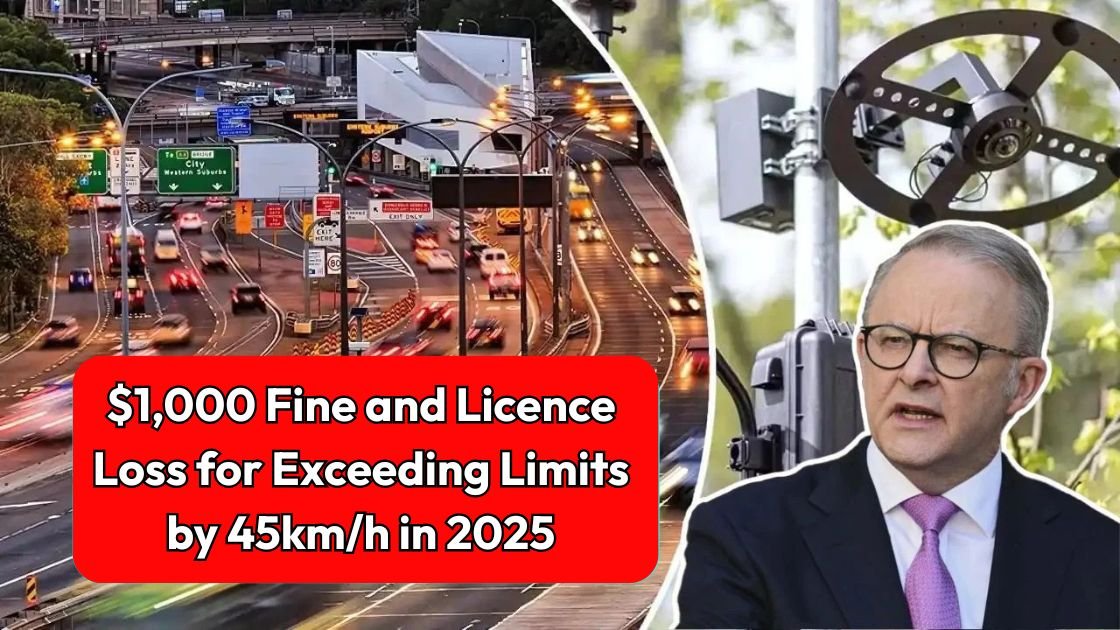Speeding has always been risky, but in 2025, Australia’s road rules are getting stricter than ever. Exceeding the speed limit by 45km/h or more now triggers a $1,000 fine, automatic licence suspension, and demerit points that could keep you off the road for months. This update targets dangerous driving to cut down on accidents and save lives. If you’re behind the wheel often, here’s what you need to know to stay safe and compliant.
Why the $1,000 Fine for Extreme Speeding?
Australia’s government is ramping up penalties to tackle reckless speeding head-on. Exceeding the limit by 45km/h dramatically raises crash risks—studies show survival chances drop sharply due to longer stopping distances and higher impact forces. The $1,000 fine, plus a six-month licence suspension for first-timers, aims to deter drivers from pushing the limits.
Repeat offenders face even harsher consequences, like longer bans and more points. It’s all part of a broader push for road safety, focusing on high-risk behaviors that endanger everyone.
Licence Suspension and Demerit Points Explained
Getting caught 45km/h over isn’t just about the fine. Police can suspend your licence on the spot in many states. Here’s the breakdown:
- First Offence: Automatic six-month suspension and demerit points (typically 6 or more).
- Repeat Offences: Suspensions extend to 12 months or longer, with accumulating points that could lead to full disqualification.
Demerit points stay on your record for three years, making it harder to renew or regain your licence. This tiered system ensures serious speeders face real accountability.
Australia’s 2025 Speeding Fine Structure
Fines and penalties vary slightly by state, but the structure is similar nationwide. Exceeding by 45km/h falls into the highest tier, often treated as “excessive speeding.” Below is an overview based on common penalties across states like NSW, Victoria, and SA (adjusted for 2025 rates).
Speeding Penalties Table
| Speed Over Limit (km/h) | Fine (AUD) | Licence Suspension | Demerit Points |
|---|---|---|---|
| Less than 10 | ~$250–$300 | None | 1 |
| 10–24 | ~$400–$500 | None | 3 |
| 25–44 | $550–$900 | 3–6 months | 4–6 |
| 45 or more | $1,000+ | 6–12 months | 6+ |
Note: School zones double fines and points. Heavy vehicles or corporate drivers face higher penalties.
How Speeding Offences Are Enforced
Authorities aren’t messing around. Enforcement relies on a mix of tools to catch speeders:
- Fixed Speed Cameras: Monitoring highways and urban areas 24/7.
- Mobile Speed Cameras: Hidden in vans for surprise checks.
- Police Patrols: Random stops and radar guns on high-risk roads.
In states like NSW, exceeding 45km/h can lead to immediate roadside suspension. Victoria and SA emphasize average speed zones to nail consistent speeders.
Community Views on the New Rules
Reactions are split. Road safety advocates cheer the changes, arguing they’ll slash fatalities—especially among young rural drivers who speed more often. They push for pairing fines with education programs to build better habits.
On the flip side, some motorists call the penalties too harsh, saying they punish without addressing root causes like poor road design. Still, most agree: safer roads benefit everyone, from families to commuters.
Tips to Avoid Speeding Penalties
Stay under the limit and keep your licence intact with these simple habits:
- Use cruise control to maintain steady speeds.
- Watch for variable limits in school or construction zones.
- Check your state’s transport app for real-time updates.
- If caught, consider a court election for possible leniency—but only with legal advice.
Driving smart isn’t just about avoiding fines; it’s about getting home safely.
FAQs About Australia’s 2025 Speeding Fines
What happens if I exceed the speed limit by 45km/h or more?
You’ll face a $1,000+ fine, 6–12 month licence suspension, and at least 6 demerit points.
Are speeding penalties the same in every state?
Mostly similar, but fines and suspension lengths vary slightly—e.g., NSW allows roadside suspensions, while SA caps max fines at $2,500.
Do repeat speeding offences lead to worse penalties?
Yes, second or third offences mean longer suspensions (up to 12 months) and more demerit points.
How do authorities catch speeders?
Through fixed cameras, mobile units, police patrols, and average speed detection zones.
Can I fight a speeding fine in court?
Yes, elect court within 90 days of the notice, but success depends on evidence—consult a lawyer.




